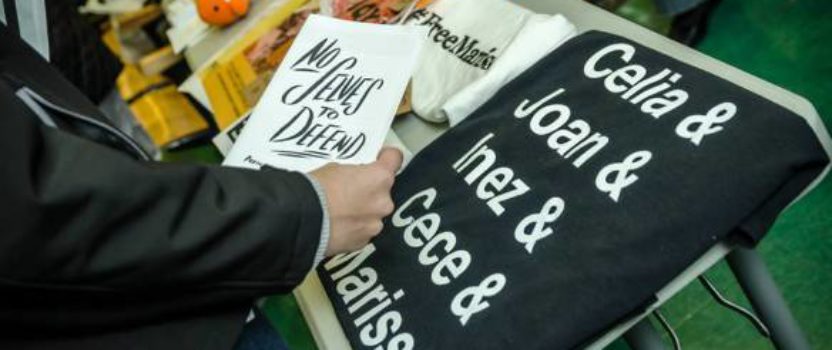I Won’t #TakeaKnee Until the Movement Against Police Brutality Centers Women of Color
Editor’s note: TW for domestic violence.
I’ve been hesitant to #TakeaKnee.
I am of course always inspired and energized by new advocates joining the movement for the first time. We all started somewhere. We are all on a journey. Our political analysis evolves over time with exposure, experience, and community accountability. I am grateful to Colin Kaepernick for taking a knee and for being outspoken about white supremacy and state violence. And I am grateful that NFL players are kneeling in solidarity.
But I’m tired of gendered violence taking a back seat.
Amid the headlines and national outrage this weekend, people seem to have forgotten — or conveniently erased — the experiences of Black women and women of color as victims and survivors of state violence. Because yes, state violence affects women of color, too. Today, Paris Knox is in court in Chicago, appealing her 40-year sentence for defending herself against her partner when he showed up at her home.
Police brutality doesn’t necessarily manifest the same way for women and femmes of color as it does for men. In many cases, women’s experiences with state violence are tied to their experiences with domestic violence. Fifty percent of women’s homicides are by a partner, and Black women have the highest intimate partner homicide rates. And yet in the cases when Black women fight to survive, they often face incarceration, perceived as having no selves to defend like Paris Knox and Bresha Meadows. Women are even held accountable for the violence of their abusers with “failure to protect” laws. In 2014, a Buzzfeed News investigation found 73 cases of mothers who were sentenced to 10 or more years in prison between 2004 and 2014; 38% of these mothers were domestic violence survivors. Just last year, Danielle Whyte was charged with manslaughter when her boyfriend strangled her infant son to death and then threatened to kill her if she called police.
With state violence against women of color so frequently tied to our experiences with domestic violence, it is difficult for me, as a woman of color and as a domestic violence survivor once jailed for self-defense, to kneel with NFL players, many of whom have been accused of domestic violence or sexual assault.
And the NFL’s gendered violence problem is surpassed still by law enforcement officers. Between 24 and 40 percent of police officer families have experienced domestic violence, up to four times as a high as the rate of the general population. Police sexual assault is also the second most common form of police brutality, with a police officer caught in an act of sexual misconduct every five days, and this data doesn’t include the officers who never got caught. It also doesn’t include most incidents of police sexually assaulting sex workers, which in some states police assert is their right.
Too frequently, these narratives are missing from the larger conversation about police brutality, an omission that Andrea Ritchie works to highlight in her new book Invisible No More.
For women of color to be included, state violence and gendered violence must be tackled simultaneously.
When I think about the divisions in this movement, I also think about my own experience in an abusive relationship: how shocked I was when he hit me. It was surreal to me that this betrayal would come from someone so close to me — my own partner who I loved and shared a home with. I saw the barriers he was facing to becoming sober and nonviolent, and I was invested in his progress: I believed that his success was my success was our success. He always made me believe that he was fighting for me, for us. I believed that we were in that fight together.
I spent years focusing on his needs, believing that if we could solve the problems that he was facing then eventually that work would pay off and end his violence against me. But instead it kept getting worse, as abusive relationships often do. The violence escalated, and I could have lost my life in that relationship.
Too often, anti-violence movements feel like abusive relationships themselves. Black women and women of color are consistently asked and expected to fall in line. We are told that we must prioritize the needs of Black men in the movement against state violence and the needs of white women in the movement against gendered violence. We are shamed, silenced, and gaslighted when we ask if our needs will also be addressed and included in this fight. We are called “divisive” for asking to be included.
I’m hesitant to put my life on the line again for men who tell me that we’re in this fight toward liberation together when we’re not.
It should not take away from your needs to also acknowledge my needs. If you can’t say that my needs are just as important as yours, if you don’t speak out against gendered state violence, if you believe that somehow seeing and speaking up about my needs takes away from your cause or your movement, then you’ve already thrown me under the bus to drive forward without me.
And I’m tired of fighting for men who aren’t fighting for me.
If you believe that this message is divisive, that it takes away somehow from the masses who connected to Kaepernick, remember that you are dividing two issues and two movements that for me are completely intertwined.
Image credit: loveandprotect.org

